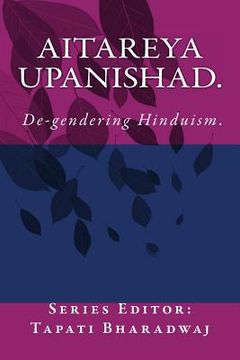Aitareya Upanishad: De-gendering Hinduism. (en Inglés)
Reseña del libro "Aitareya Upanishad: De-gendering Hinduism. (en Inglés)"
This rendition of an Upanishadic text is but a part of a larger series; the aim of this work is to construe Hindu religious texts as literature, and examine them within a gendered inflected analytical framework. What prevents us from examining the Upanishadic or the Vedic texts within a literary or a gendered perspective? If the basis of religion is "revealed knowledge," which was made evident to men - then is it not obvious that these notions of the Absolute Being would but be defined within gender inflected terminologies? The personal gender-biases of men would affect and predetermine how the notions of the Supreme Being were written about. Let me explain with an example from an Upanishad. In the Aitareya Upanishad, the first stanza reads in the following manner: "Om! In the beginning this was but the Absolute Self alone. There was nothing else whatsoever that winked. It thought, 'Let Me create the world.'"We have to keep in mind that the Vedic texts are partially truthful - they are correct in their explanations on the notion of Absolute Consciousness which becomes matter, and there is no gender ascribed to this Absolute Being. The "Absolute Self" is denoted within gender neutral terms and is referred to as "It." But there is a slippage which occurs in the Vedic texts, making these texts suspect: it reveals the fact that those who were writing about this kind of revealed, divine knowledge were men and their interests are evident in how the notion of Absolute Consciousness is defined and described. In the same Vedic text, we will find gender specific characteristics of the Absolute Being. The second stanza of the Aitreya Upanishad reads in the following manner: "He created these worlds, viz. ambhas, marici, mara and apah. That which is beyond heaven is ambhas. Heaven is its support. The sky is marici. The earth is mara. The worlds that are below are the apah."A shift occurs whereby, "It" becomes "He": and we all assume, and accept, that the Absolute Being has to be male. To follow this statement to its conclusion, we can state that as the Vedic texts equate the "Absolute Self" with the masculine, men are seen as being agents; in the second part of the Aitreya Upanishad, the first stanza reads: "In man indeed is the soul first conceived"; the implication is that men are agents in determining the birth of children while women are mere passive receptacles.EXTRACTS FROM THE TEXT: Original Text: In man indeed is the soul first conceived. That which is this semen is extracted from all the limbs as their vigour. He holds that self of his in his own self. When he sheds it into his wife, then he procreates it. That is its first birth.Revised Text: In wo/man indeed is the soul first conceived. That which is this ovum/semen is extracted from all the limbs as their vigour. S/he holds that self of hers/him in her/his own self. When s/he receives/sheds it into her/his partner, then s/he procreates it. That is its first birth.Original Text: She, the nourisher, becomes fit to be nourished [protected]. The wife bears that embryo (before the birth). He (the father) protects the son at the very start, soon after his birth. That he protects the son at the very beginning, just after birth, thereby he protects his own self for the sake of the continuance of these worlds. For thus is the continuance of these world ensured. That is his second birth. Revised Text: She, the nourisher, becomes fit to be nourished [protected]. The wife bears that embryo (before the birth). The parents protects the child at the very start, soon after its birth. That the parent protects the child at the very beginning, just after birth, thereby the parent protects its own self for the sake of the continuance of these worlds. For thus is the continuance of these world ensured. That is the parent's second birt

